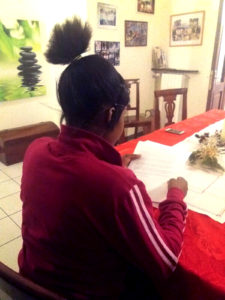
Nineteen-year-old Precious is a smiling, laughing, living testament to human resilience. She sits at the end of a table in a safe house near Rome for Nigerian sex slaves who have managed to escape their exploiters and tells me her story.
The first impression of Precious, with her beautiful, gentle face, smooth skin, lively brown eyes, and warm smile, is deceptive. Her hair, long strands of brightly colored yarn woven through it, is piled up on top of her head and held together in a net. She seems like a carefree late teen, spunky and exuberant. But then she tells me her story. It takes nearly two hours and she is calm throughout, even smiling and laughing and frequently giving credit to God for getting her a step closer to her dream of studying to become a nurse. Never a word of self-pity or a recognition of her own determination and courage in saving her life during over a year of living in extreme danger.
In 2016-2017 this girl survived a year’s journey across northern Africa with just the clothes she was wearing when she left home, “a shirt and trousers”. She had no money; she watched others around her die; she was obliged to have sex with dozens of men; and she spent periods without food and water. She was held in connection houses, prisons, and detention centers where men fired guns at random and raped women at will. She doesn’t know how to swim but survived a boat sinking and was brought back to Libya and thrown in prison. When she finally made it to Italy, the Nigerian Mafia rewarded her with a spot on the road near Turin and a demand to pay a debt of 20,000 euros while earning 10 euros for each sexual act. But Precious does not feel sorry for herself.
Her story begins in January 2016 when she was still living with her mother and three siblings in Benin City, Nigeria. She was training to become a nurse in a hospital there. A woman told her mother about the possibility of sending Precious to Europe to continue her studies. A short time later, Precious was on a bus headed for Lagos with just a t-shirt and the pants she was wearing. In Lagos, she stayed at a hotel with 10 other girls. “All the other girls were so pretty,” she said. “I was excited because it was good news to me. They knew about the journey, not like me. They were all pretending they were going to study. They knew about it but they never told me.”
“When we left Lagos in the evening I thought we were going to the airport to go to Europe, I was very happy.” Instead, Precious was put on a bus with a bunch of girls for Agadez, in Niger, the point of departure for trips across the desert to Libya. The bus took five days to get to Agadez where Precious learned that she would be making the desert journey. Three days later they began their trip in the back of an open bed truck across the desert. She had no money, just the same shirt on her back and the pants she was wearing when she left home.
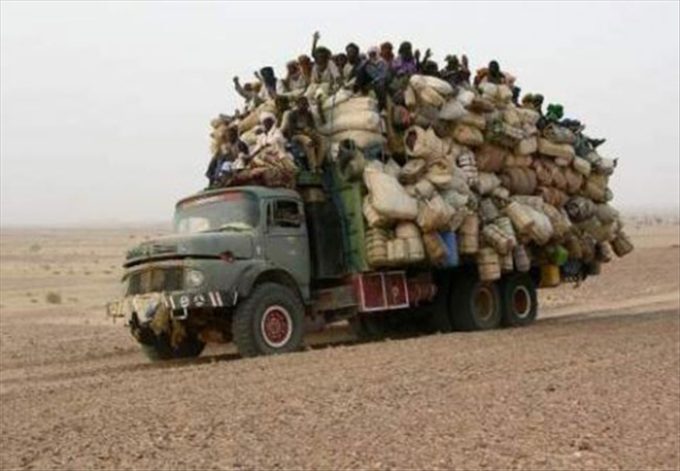
“It took four days. We stopped and slept in the desert and then keep driving. One truck behind us flipped over. I don’t have any money but nobody harmed me. It was God’s work that no harm came to me.” Many migrants die during these journey and their bodies are just tossed out into the sand and left there.
Finally, Precious arrived in Quatrun, Libya. “We sleep there. There are all Nigerians there. I am still hoping I am going to study. That was the thing I was holding on to.” But there, things started to change, a woman came and took the other Nigerian girls away but left Precious behind. “When the girls came back, I asked them “what happened?” They didn’t tell me. They were raping them. They were taking them and raping them and they did not want to talk about it. They were quiet.”
From Quatrun, Precious continued her journey in another open bed truck with other Nigerian women on to Sabha where she was put into the hands of a Nigerian Madam named Cristina at the Dhabi Cafe in the “Ghetto”. Ghetto is what the migrants headed to Europe call the slum area where they stay in connection houses waiting for the next leg of their trip.
Cristina, who was some sort of Madam/connection woman, informed Precious that they needed more money for her to continue her journey and made some calls demanding someone pay. Precious did not have any money so she would have to wait until someone paid or earn it herself.
Four of the girls traveling with Precious were taken away, but Cristina kept Precious aside and noted “she is a beautiful girl,” before passing her on to a young Nigerian man named Sunday who arranged for her to leave on another truck for Tripoli.
From talking to aid workers who have interviewed dozens of girls like Precious, it seems that her traffickers were protecting her because of her beauty. She repeatedly tells of other girls being violently raped while she was not. Perhaps they wanted to get a higher price for her. However, another girl I spoke to, living in the same safe house with Precious, equally beautiful, but with darker skin, did not have that luck. Mercy suffered such physical abuse and rape on her journey that she would not talk to me about it other than to say “I was treated very badly.”
Precious arrived in Tripoli in March of 2016 and there endured a harrowing six- month odyssey getting moved from connection houses, to prisons and camps. She still had no money and just the shirt and pants she left with. In one camp she made a friend named Justine who had a “boyfriend”, a Nigerian man who gave her money. Justine took Precious under her wing and Justine’s boyfriend managed to arrange for them to be “pushed out” on a boat for Europe. Migrants use the expression “pushed out” when they are put by traffickers in a dinghy in Libya and pushed out to sea in the hopes of reaching Europe.
A contact with the International Organization for Migration told me that these girls often get in a relationship with their exploiters who they might refer to as a boyfriend. It is not exactly the “Stockholm Syndrome” but it is a similar survival strategy to have a person who protects them in the no man’s land that Libya has become.
Justine and Precious were taken to the seaside. Precious had never seen the sea before and does not know how to swim. At the sea, there were Arab men. “The Arab men are always with guns. I can’t see an Arab man that does not have a gun,” Precious said.
For some reason, it did not work out. Precious and Justine were sent back. They were forced into another connection house with about 1,000 people packed inside with just some bread to eat once in a while. “We called it the red-eye camp because all the men there had red eyes, they were always angry, always violent. They come in our room and shoot the gun in the air.”
Finally, on April 25th, 2016, Precious and Justine managed to get into a rubber dinghy headed for Europe that was “pushed out.” There were about 120 people in the dinghy. Precious said some people had life jackets but she was among the many who had no money for a life jacket. All the women were put in the middle and the men placed around the edges. In a description of the departure that many migrants have recounted, “The Arab man (trafficker) drives the boat out then jumps in the water and swims and enters the flying boat.” The “flying boat” would be the small fast motor boats used by the traffickers to retrieve the driver who has taken the boat out from the coast.
A huge problem with these cheaply made, large rubber dinghies described by migrants and rescue workers is that the fuel leaks into the bottom and, mixing with sea water, causes terrible burns on the skin. The women and children are usually the ones with the worst burns because they are all placed in the middle and the men are given the safer positions on the inflated areas around the edges.
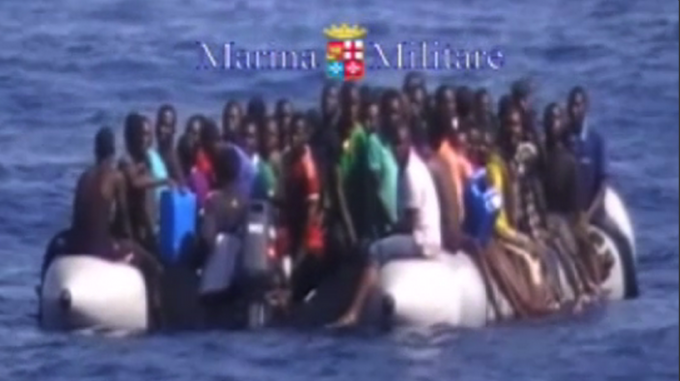
Once again, it did not work out. As so often happens with these dinghies, it started taking on water and sinking. “People were dying, water was entering in. All the women in the middle were standing up. I was praying because I don’t want to die.”
From her description, it seems that Precious and part of her group were rescued by the Libyan Navy or Coast Guard. She said that Arab men came in an expensive boat and took first the women. “People died, maybe 50, maybe more than 50; 60 people were rescued and taken back to Libya with the soldiers.”
She said the soldiers told them they had to pay money or they would be sent to prison. Justine was able to call her “boyfriend”, the connection man, who came and paid for Justine to escape. He did not pay for Precious. Her only friend left her behind. “I was very sad. I cried when Justine left me.”
Precious did not cry for very long. On a Friday, when her captors went to the mosque, she escaped through the window with other migrants. They hid in the bush but after a day without water and food she decided to go out on the road with a group of “girls and boys from Nigeria”. There they were picked up by an Arab man who kept them at his home for two days before bringing them back to a camp.
At this point in her story, Precious said it was July, 2016 and she had been traveling for seven months. Perhaps having learned from her friend Justine the usefulness of having an exploiter as protector, Precious became close to a man named Abdul. Seemingly unaware of the contradiction in her words, Precious explained, “He says he loves me and wants to marry me. He pushed us out in July.” Surely Abdul knew that Precious was going to end up forced to sell her body on the street and he was probably earning a fair amount sending her off.
So Precious was “pushed out” again on a boat headed for Europe. On this trip no one on board understood how to navigate and Precious’ dinghy ended up traveling from Sabratha, Libya and landing further down in the coast in Zuwara. Again, she escaped with the others to a “big road”, where they got picked up and thrown in a camp again.
Again, Precious met a man who “helped” her. This time he was a connection man from Ghana named King. “King gave me money to buy something. King was a nice person.”
I asked Precious if she bought some clothes with the money, and she said no. She said she got some clothes on the beach. When the traffickers load migrants in the boats, they make them leave everything they have behind, so they often leave clothing on the beach which other migrants, who are not “pushed out,” can pick up and use. The Nigerian girls I spoke to who made it to Italy said they arrived with just the clothes on their backs and a phone number (of a Nigerian connection person, usually a Madam) tucked into their clothing somewhere.
Last month, a Spanish rescue ship brought the bodies of 26 Nigerian women to shore in Salerno, Italy. The rescuers had fished the bodies out of the water while saving hundreds of other migrants. Autopsies were conducted in Salerno and an effort was made to identify the bodies. They managed to identify only two of the women. A police investigator told me most of them had phone numbers on them but they had no luck finding relatives when they called the numbers.
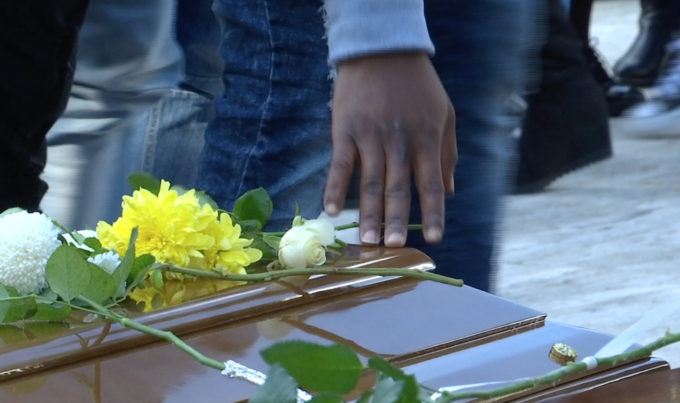
Despite the dangers, the Nigerian women continue to arrive. According to the International Organization for Migrants between January 1 and November 30 of this year 5,399 Nigerian women have arrived by sea in Italy.
In September 2016, King arranged for Precious to be “pushed out” again. It was the same story. Women crowded on top of each other in the middle of the dinghy. The boat began taking on water. All the migrants frantically used their clothing to soak up the water in the dinghy and wring it out overboard. Finally, a helicopter flying overhead spotted them and a while later the “flying boats” arrived. But this time the “flying boats” were speed boats belonging to Spanish rescuers. “They take the babies first and the pregnant women. Our boat flipped over but I was already rescued.”
They were taken to the port in Reggio Calabria on the toe of the boot of Italy.
Over the past several years, I have watched many of these rescue ships dock in Italian ports. The migrants, exhausted from their ordeal , shuffle off the ship, usually barefoot, and stop under small temporary tents where they are given flip flops, are finger-printed, photographed and given numbers. While the living migrants are going through this process, workers use cranes to unload dead bodies off the ship. The migrants are eventually lined up and put onto buses to be taken to centers around Italy. When she got off the boat Precious notes “All I have is the phone number for my mother (back in Benin City) in my head and all I was thinking is Thank God this time I am not in Libya again because I really suffered a lot there.”
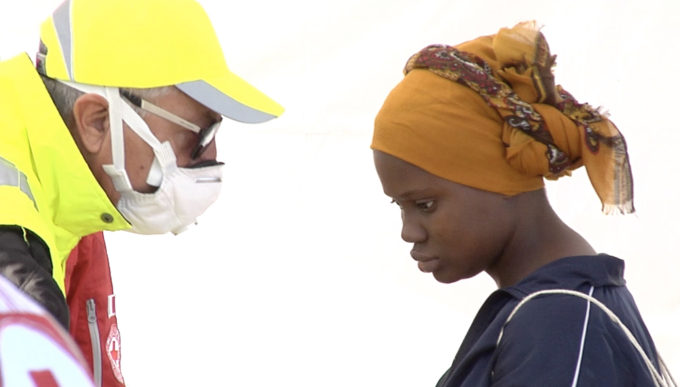
But her suffering was not over. Precious naively believed she was going to be allowed to study. As with all migrants who arrived in Italy, Precious was taken to a migrant center in Campobasso, a small town in southern Italy. Various groups, including the International Organization for Migration, Medecins Sans Frontieres, Save the Children and UNHCR try to talk to the Nigerian girls before they can make the call to the Nigerian connection people. But it is not easy.
Officials from the IOM and UNHCR say the victims of trafficking are usually between 13 and 24 years old and they are continuing to get younger. IOM spokesman Flavio Di Giacomo told me, “Some of these girls are so young that they do not even know what sex is, so when we tell them that there is a risk they can be exploited sexually, they don’t even really know what we are talking about.”
As one Italian women who works at the shelter explained to me, the phone number is the only certainty they have. They are completely in the dark when they arrive, they are in an unknown land and looking for a handhold to grab on to. That handhold is a telephone number to someone from their country whom they expect to help them. Precious had lost that number so she called her mother back in Nigeria who gave her a number to call a person in Italy. “Somebody was coming to take me and I go to school.”
Somebody did come to get her, a Nigerian “boy” who took her to the train station in Naples and put her on an overnight train for Turin. She arrived at 8am and a woman picked her up and took her to a house where she was able to bathe and sleep.
“The woman told me she would be responsible for me and I would stay with her for some years. I said, ‘when am I going to school?’” The woman informed her there would be no school. “No school for me? I said, then what am I going to be doing?”
She soon found out. “She brought white men to sleep with me in that house. They pay that woman. She told me I have to pay back 20,000 euro.”
“I was very angry, I wanted to escape, I was sad. I was even crying.”
Precious slept with white men in that house for a week and then the madam forced her to start working on the side of the road. Northern Italy in the fall is cold. Precious wore a jacket and a short skirt because she always obliged to have her bare legs exposed to attract clients. She spent October and November working on the road. She said she often went and hid in the bushes. Men would pay her 10 to 20 euros for sexual acts. “Some are very respectful but some do it with violence,” she explained. Precious said she used condoms but some of the other girls did not because then the men would pay more. This went on throughout the winter.
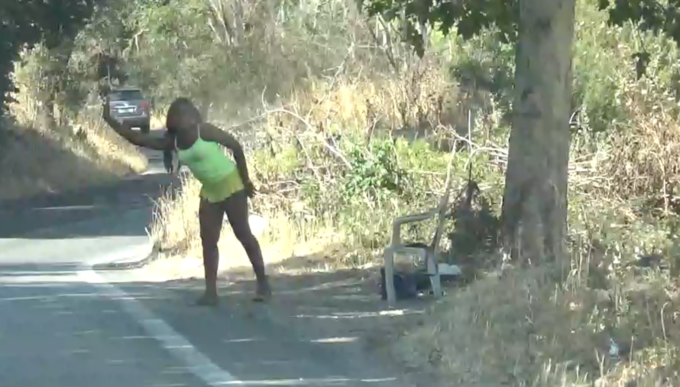
Via Tiberina, just beyond the city of Rome’s ring road, the Grande Raccordo Annulare, is the place to find Nigerian prostitutes in Rome. The road curves through the countryside with piles of trash along the sides. On any given day summer or winter, rain or shine, one can find scantily dressed Nigerian girls sitting on broken wooden or old plastic chairs. Some are bent over looking at their cell phones, others jump up and wave enthusiastically at drivers. All are in shorts or miniskirts and revealing bra tops, many in platform shoes. Frequently cars pull over and pick up a girl and leave or stay by the side of the road for the duration of the encounter.
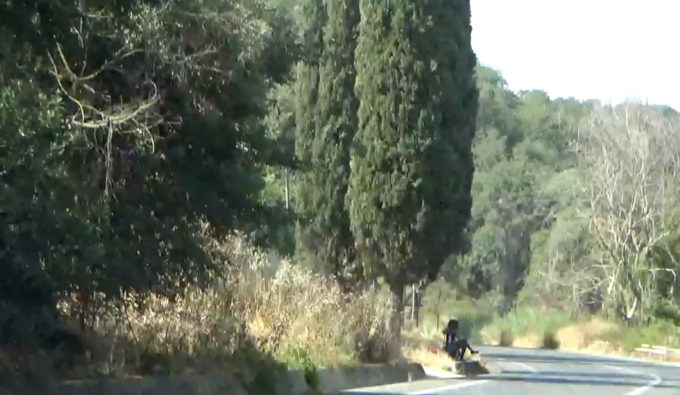
Alberto Mossino runs PIAM, a non-profit organization with centers helping 250-300 young Nigerian women to get off the streets in Northern Italy. He says that the Nigerian Mafia is flooding the market in Italy with young women. Whereas back in the 1980s they would bring the women on planes and demand they pay back roughly 65,000 euros in debt, now they bring many more women in on boats and the debt has dropped to about 20-30,000. He told me that they are bringing in younger girls, often illiterate so that they can control them more easily.
Precious, however, is smart and capable and early on started to think of ways to break out from the yoke of sex slavery. Her madam got worried that Precious might escape so she asked for some hair and nail clippings. She put the clipping in a napkin and took them away saying they were going to do Juju (voodoo). With the Juju she would have to stay with them or something bad would happen to her family.
Unlike many of the Nigerian girls, Precious did not participate in a Juju ceremony before she left, and seemed indifferent to its effects. Many of the other girls, however, go through a Juju (voodoo) ceremony before they leave in which they swear in front of a shaman that they will pay back their debt to the traffickers. Precious’ housemate Mercy explained to me how she had to strip naked in front of the shaman in Nigeria, give him clips of her pubic hair and nails and make a promise to pay back the traffickers, “They will be trying to control me with juju, if I disobey many things will be put to me,” she said.
In April, Italian police picked up Precious on the road and took her to the station and fingerprinted her. She was scared of being deported but they told her not to worry. Eventually she went to court in Turin where she met many people, lawyers and aid workers who helped her move to the safe house near Rome.
According to the IOM, Under Article 18 of Italy’s “Consolidated Act on Immigration” “a foreigner whose safety is at risk due to attempts to escape a criminal organization committing crimes such as forced prostitution, child exploitation, begging, enslavement and human trafficking…” should be able to get a residence permit for “social protection.” But Italy is famous for its bureaucratic red tape. So, Precious is waiting and hoping to get her documents so she can stay in Italy. The traffickers have called her mother in Benin City and asked where she is, telling her mother that she owes them money and threatening to use the Juju against them. Precious’ mother has said she does not know where her daughter is.
Precious comes to the end of the story – nearly two years of suffering – and gives a little shrug and a laugh at what she has come through. “It was God’s work that no harm has come to me,” she announces as I pause in my note-taking and try to grasp all she has just recounted. Precious gives no credit to herself in all this. No recognition of her own tenacity and indomitability. I am dumbfounded and inspired.
(All the names in this story have been changed to protect Precious)
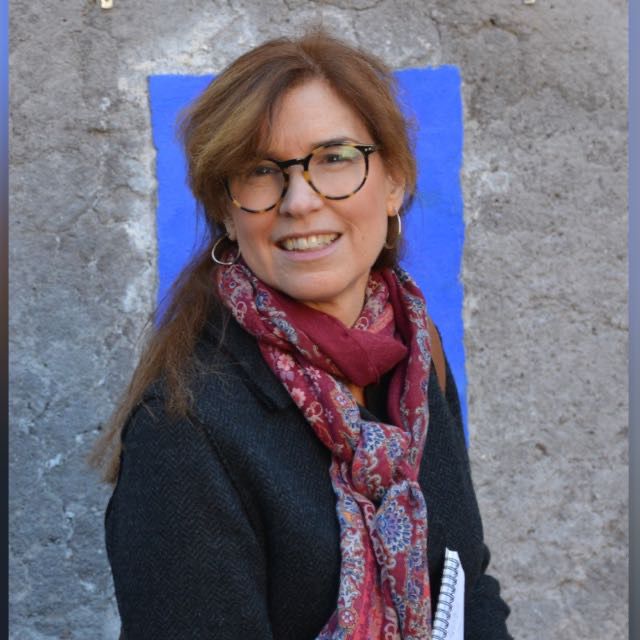
we live in a system where everything, including human beings, is commodified – it and its ‘managers’ would have us pay for the air we breathe if they could.
Yes Alan, so true and so sad. Thanks for reading my post though. I am eager to share Precious’ story.
Really powerful, Trisha. I appreciate keeping up with this reality in your writings.
Thank you Kathryn. So good of you to take the time to read it….I just posted it because it was a story I wanted to tell but didn’t think anyone would bother reading it all having it come so close to the holidays.
And I almost forgot, I wish you a wonderful holiday season and a happy 2018!
Very powerful and sad story. As a resident in Umbria, I often see these young women on the side of the road. What can we do for them? Is there an organization you recommend to make donations or to volunteer? Thank you for doing this work.
Hi Susan —
There are a lot of excellent organizations trying to help these girls. A few names are Be Free, Slaves No more, Casa Rut and PIAM. Here are their websites:
http://www.befreecooperativa.org/wordpress/
http://www.slavesnomore.it/
http://www.associazionerut.it/
http://www.piamonlus.org/
I think they are all running of very low budgets and would be very happy with any donations or volunteers.
It is difficult to believe that people are capable of such dreadful treatment to others. I hope this girl and others like her come through this horror and have better lives.
You do have to wonder about men who use these girls and probably go home to their wives and children.
Hi Debra, thanks for reading my post. Yes, I also do wonder about men who pay these girls 10 euros and then head home to wives, children or whatever. Some of these girls have told me that these men do not what to know. Mostly it is white men who want the thrill of sleeping with a black woman/girl. They also don’t want to hear about problems. They don’t want to be asked for help. They want quick “drive-thru” sexual satisfaction and then get on with their lives. And, believe me, there are a lot of men out there who are making this business a financial success.
So very sad and many, many untold similar stories. One of my students was a refugee from Somalia. She often came to class with bruises and scratches. When I asked her about it she would tell me that her baby brother scratched her. One day she came in with some very deep scratches on her face and when I told her there was no way that a baby could have created those marks. she broke down and told me that her family had paid for her to enter the USA under the guise of being the daughter of a woman who had been granted refugee status. Coincidentally during this time, she won a NAMI competition which had a prize of $1000 and she quickly used the money to pay off her debt to her”foster mom” and left Maine to join an older sister in Minnesota. I kept in touch with her for a while and then we lost contact. I think of her often, she was a very lovely young woman and one of the lucky ones, I suppose.
Oh dear Lega, what a sad story. And I had no idea those things were happening in the US as well. Good for you for trying to help her. I hope she is doing well now, wherever she is. I am convinced that Precious is going to succeed in all of her endeavors.
Trisha:
Americans need to read your story of Precious. I’ve read others, but your story of Precious is told with an objectivity that cuts deeper because of your dispassionate tone. Surely there’s a media (maybe not just print) outlet here that would be glad to publish your version of her epic story for a sizeable audience in the U.S.
Precious is life itself, our most precious possession! The life of this beautiful young person being so ordinarily devalued as a sex object leads us to a deeper discussion about seeing ourselves living in our world-wide, male-dominated, money-power culture as we commoditize each other for whatever purposes the market wills.
Your story is told at a level of social chaos and in a place where sexual abusers seem to have nothing to lose and money to gain because there is little or no justice system. Her story is unlike what is going on in America, where the sexually abused are getting legal recourse through press attention, because it’s approached with the idea of punishing rich and powerful abusers (“How could they!” or “What could they have been thinking?”). The press is having a field day creating sex-abuse scapegoats for their fame and “respectability”, and the abused are rightly being respected for their gutsiness in calling out their intimidating abusers. But Precious’ story offers a panoramic view of sex abuse that originates far deeper in the human soul than our shallow press here illuminates. Your story is about the deep preciousness of the lives of all women–and men–in a culture that we must create anew as this world turns 24/7.
“Ivanka, Melania, and all women, introduce The Donald to Precious!”
Thank you Roger. Sadly, I am not sure how many news organizations would want me to tell Precious’ story. Part of the reason I am publishing it here is that I have been struggling for over six months to convince my employer, the Associated Press, to let me tell her story and others. I have been pushing AP to let me do a cross-format, cross continent story — in other words, wire, photo and television in Italy and in Africa. But I keep on coming up against editors saying “this has been done”, “others have reported it”, “what are you offering that is new?, “what news are you breaking here, Trisha?” It is true, others have reported on this phenomenon…the New Yorker, CNN, the Guardian. But I have been insisting with the AP that we have the unique possibility to cover these Nigerian girls in Benin City, in rescue boats in the Mediterranean and on and off the streets in Italy. We can talk to police and prosecutors battling the Nigerian Mafia in Italy, and we can interview Nigerian government officials. More importantly, we can talk to girls/women like Precious. Why are we not doing this?? The traffic has been increasing, the girls are getting younger, there are more illiterate girls, and I have been told the traffickers are evening sending girls with a low level retardation just because they are easier to control. So why not spend the money to cover this story properly? Why is there so much interest in powerful abusers and their accusers in the West, but no interest in a lovely girl with an indomitable spirit and incredible tenacity? We all know the answer to that. Because they are African. How many major news organizations even have a presence in Africa? At least I am proud to say the AP has that. I have not given up though. One of my resolutions for 2018 is to convince the AP to do this story. Maybe I can show some of my bosses this post. Thanks again for your support.
Please show my note to your bosses. Nearly a half century ago I sat in on weekly pre-production meetings for SESAME STREET and was impressed with how clear they were on their teaching goals for the series they were planning. I’m thinking if you want to address the worldwide sex abuse problem, some similar media teaching efforts should begin at about that age level. Of course there was no “H is for Ho” or “P is for Pimp” on Sesame Street. Be that as it may, today it’s a deep dive that needs to be taken to get to the root of why it is that worldwide we are so plagued with the devaluation of women. I keep saying we need a “Sesame Street for Adults” to prepare us all today for life in and off the streets. Reducing sex abuse would be one of its teaching goals.
Good luck to you with promoting your story! I appreciate what you’re doing with your blog.
Roger
Oh Yes!! Bring on Big Bird, Grouchy, and the Cookie Monster….we could all use a little education. What a wonderful show that was.
Hello Trisha,
Thanks for telling her story!
I live in Benin City and we hear these stories everyday and we live with the reality of what this has done to our society. However, there are a couple of things I think you should know as regards these girls, traffickers and our society.
6 -10yrs ago, I would agree that most of these girls did not know what they are getting into.
The awareness that the only job available to them is prostitution is now public knowledge in the past 5yrs. So please these girls know it is prostitution.
Precious was in Nursing school before she left Benin, it means she had some level of education and so was very aware that nobody was going to send her abroad to go to school when she didn’t apply to any school. Again who pays the tuition?
Sadly these girls have been coached that to survive when caught by the authorities, it is better to feign ignorance of the “Italian end game” which is prostitution.
Also the quest for quick money makes these girls embark on this journey.
Our value system has eroded and laziness is now the new normal amongst our youths.
They don’t want to work and gradually climb the ladder of success. They want the quick and short way out.
Mothers send their children…..
Husbands send their wives….
Girls on their own volunteer to embark on this journey….
Some run away from home and join their friends if their parents/family stands in their way…..
The boys decides to sell their internal organs for quick money….
Please understand as well that some of these trafficked girls come back and build big mansions in Benin City and when you try to talk to the intending ones to not follow this route, they point to the mansions and say what does she have that I don’t. So if she can do it, so can I. I want a mansion bigger than that…. and they don’t care at what cost.
Even education is no longer attractive as they tell you that there is no need to get educated when there is no job after graduation……the most common excuse.
I agree more stories needs to be told to deter others from embarking on this journey!
However let’s tell the story of the 14yrs old that was sent on this suicide mission….. the story of the mother that wakes up and find out that her daughter is gone; ran away to go to Italy and she would spend the next 8months doing all she can to find her only to learn that she embarked on this journey to Italy voluntarily.
The story of the wife who is forced to give up her new born baby by her husband so that she can go and prostitute and send him money to buy fancy cars.
Katty —
Thank you so much for writing, I am grateful for your insights as a Nigerian women from Benin City. I am sure you are absolutely correct about everything you say. I have heard all of that– many girls that leave knowing what they are getting into, the parents that knowingly send off their daughters, the women that come back and buy mansions and become Madams. That is why I want AP to do the story on both ends, in Italy and in Benin City. It is not all black and white, good guys and bad guys, good and evil. There are a lot of grey areas. But the story needs to be told. If I ever convince AP, I will be sure to write to you so you can help give us more background. I am so grateful to you for sharing what you know.
Hi Tricia,
Thank you for your perseverance on this horrifying story. As an American…with the current #me too campaign in full swing, finally good news out of horror….why wouldn’t AP with its world wide presence be proud ….and maybe even,receive real help ..as in Precious’ case in Italy…I can’t imagine that the Pope would not want to tackle this too…we know how is fearless..and I think much of Africa is Catholic.
Many Many women children and boys and men in America have been molested from all strata…poorest of poor to practically everyone in Hollywood. It is far from “handled”…but I don’t know a woman who feels more protected and brave just over these last few weeks. Laurers fast firing …no foot dragging …made a statement..a big one….Lin all walks of life….it changed everything! One top dog going down in every culture can make a difference. The #me too and HRs are forcing scrambling and women to finally finally speak up. It’s been an endless journey in this educated , wealthy country”….but always seemed impossible…so I’m going to believe it is possible in the most challenging places on earth. No better reporter than Trisha Thomas and the esteemed…not afraid.
AP to take on NOW.
Interesting that the movie “the POST”..
Is coming out now!
Thank you for all you do for the world”
HOpe you and yours are having happy holidays
Fondly,
Annie
My goodness. What a horrific story. I so hope you succeed in convincing your editors to let you broaden this story. As some of your commenters have written, there are many facets to these stories, but people wouldn’t risk their lives if their local economy provided jobs that would allow funds for basic needs for them. Brava to you for bringing Precious’ story to light.
Thank you Linda…I certainly hope this broadening this story might be a possibility for me in 2018. And I hope you have lots of exciting projects in your pentola for 2018! Auguri!